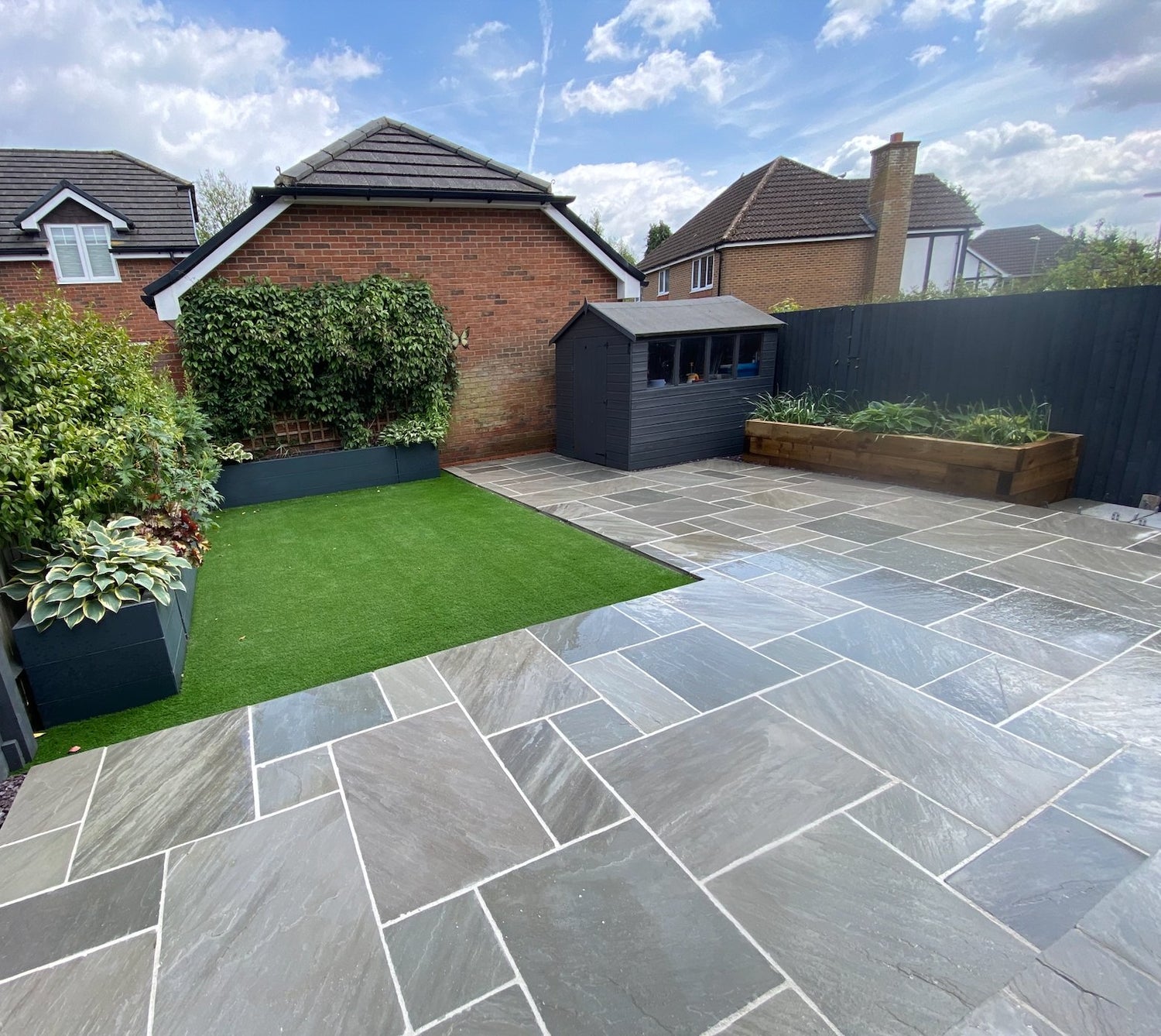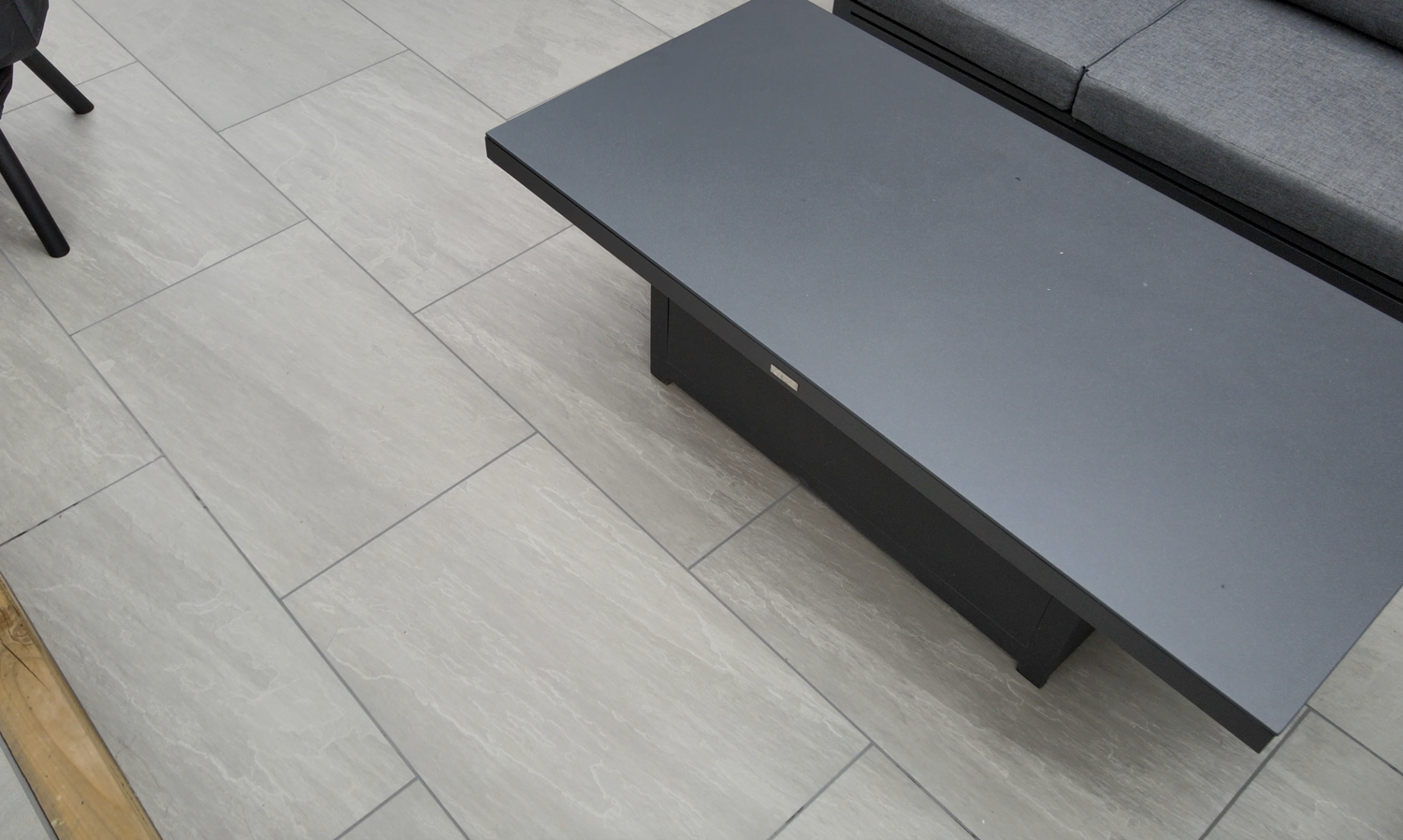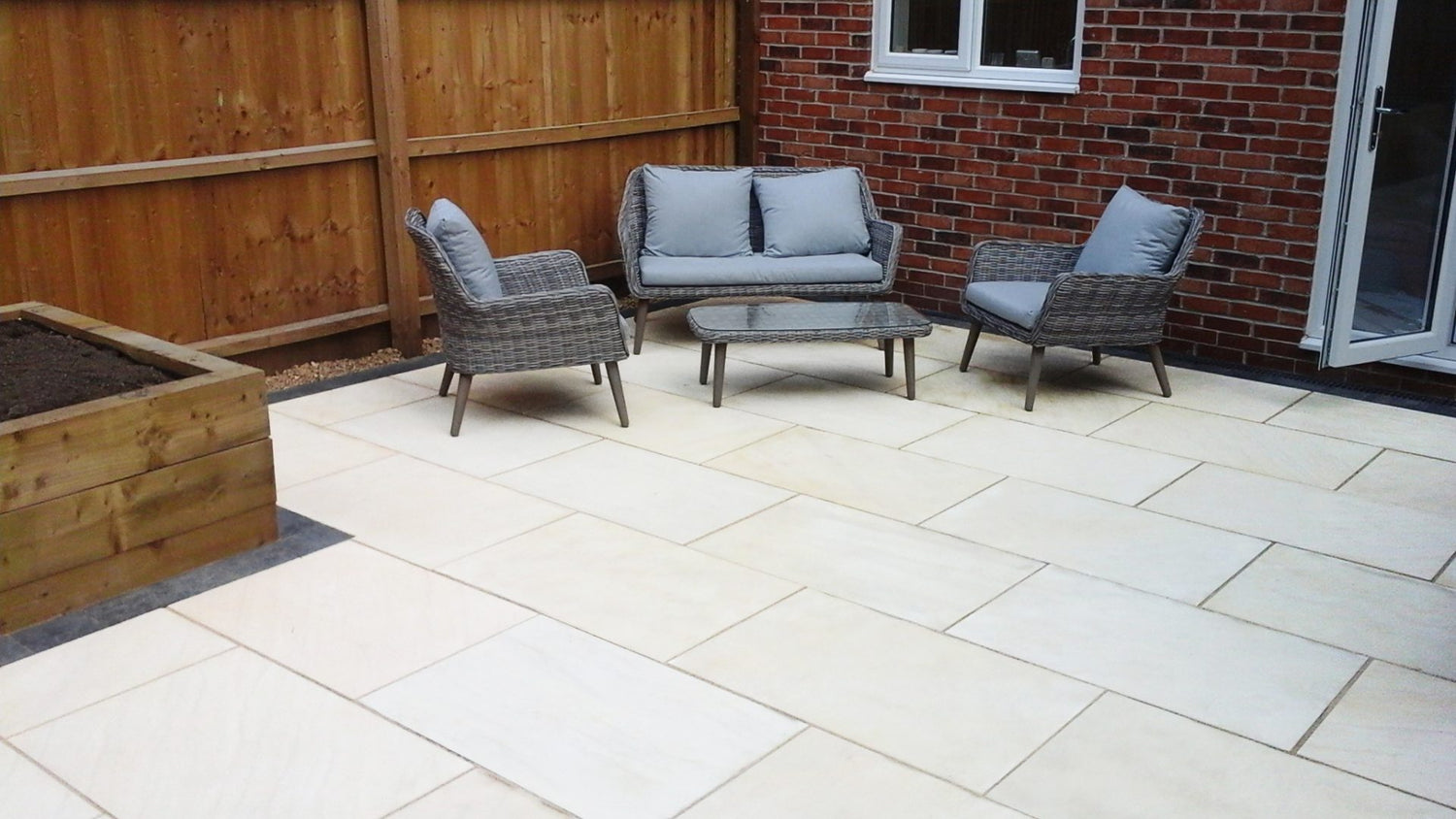
The Ultimate Guide to Porcelain Grout: Perfect for Paving, Walling & Cladding
Share
The Ultimate Guide to Porcelain Grout: Perfect for Paving, Walling & Cladding
Porcelain tiles and slabs are rapidly becoming the go-to choice for modern landscaping and architectural projects — thanks to their durability, sleek appearance, and low maintenance. But to truly get the most out of your porcelain installation, using the right grout is essential. Whether you're working on porcelain paving, walling, or cladding, porcelain grout ensures a secure, long-lasting, and aesthetically pleasing finish.
In this blog, we'll explore what porcelain grout is, why it's different, and how it can be used across different porcelain applications.
What Is Porcelain Grout?
Porcelain grout is a specially formulated compound designed to work seamlessly with non-porous, low-absorption porcelain surfaces. Unlike standard grouts, it offers superior bonding strength, resistance to water and frost, and long-term color retention.
Porcelain grout is typically:
-
Fine-grained for tight joints
-
Flexible to handle thermal expansion
-
Weatherproof, ideal for outdoor use
-
Stain-resistant, perfect for both indoor and outdoor applications
Why Choose Porcelain Grout?
Porcelain tiles, whether used outdoors as paving or vertically as cladding or walling, require a grout that complements their strength and non-porous nature. Porcelain grout offers:
-
Strong adhesion, ensuring joints don’t crack or crumble over time
-
Color stability, so your project stays looking fresh
-
Moisture resistance, reducing the risk of mold or efflorescence
-
Easy maintenance, thanks to its smooth finish and stain resistance
We recommend choosing a product from the Azpects EasyGrout range for Porcelain Paving. It comes in 4 different colours, Grafito (Black), Argent (Grey), Crema (Cream) & Blanco (Off white).
Using Porcelain Grout for Porcelain Paving
Porcelain paving is a popular choice for patios, terraces, pool surrounds, and driveways due to its sleek aesthetic and practical benefits. However, the narrow joints and hard surfaces demand a grout that can cope with external conditions.
Benefits of using porcelain grout for paving:
-
Prevents weed growth and water ingress
-
Matches the refined look of porcelain slabs
-
Withstands freeze-thaw cycles
-
Suitable for joint widths as narrow as 2-3mm
When installing porcelain paving, make sure your grout is permeable or fully weatherproof, especially if you're working in an area prone to rain or frost.
Porcelain Grout for Walling Applications
Porcelain walling creates striking vertical surfaces with a contemporary finish. Whether used for garden walls, interior features, or retaining structures, these installations demand a precise grout finish to maintain the tile’s clean lines.
Why porcelain grout works well for walling:
-
Offers high bond strength to prevent sagging or shifting
-
Resists stains and discoloration in exposed areas
-
Maintains tight joint lines for a seamless appearance
It’s important to select a grout that complements the tile color and texture for the most cohesive design.
Porcelain Grout for Cladding Projects
Cladding with porcelain tiles is increasingly popular in both residential and commercial settings. It offers a low-maintenance, highly aesthetic alternative to traditional cladding materials. The choice of grout here plays a crucial role in both the visual and structural integrity of the installation.
Key reasons to use porcelain grout on cladding:
-
Handles the expansion and contraction of vertical surfaces
-
Resists UV degradation and weathering
-
Provides a uniform look across large areas
-
Ensures lasting performance even in high-exposure zones
Whether you’re cladding a full exterior wall or a feature panel, using the right grout ensures your design stands the test of time.
Final Tips for Choosing and Using Porcelain Grout
-
Match the color of your grout to your tiles for a subtle look or contrast for a bold effect.
-
Check the joint width — most porcelain grout is suitable for narrow joints, but always confirm before purchase.
-
Always follow manufacturer instructions for mixing, application, and curing times.
-
Seal if necessary, especially in high-stain environments or when used indoors.
Conclusion
Porcelain grout isn’t just a finishing touch — it’s a crucial component that ensures the longevity, stability, and beauty of your porcelain installation. Whether you’re laying porcelain paving, installing walling, or adding sleek cladding, choosing the right grout makes all the difference.
Explore our full range of porcelain-compatible grouts to find the perfect match for your project.
Related Posts
-

Transform Your Garden with a Standalone Water Feature: Benefits & Maintenance Tips
Transform Your Garden with a Standalone Water Feature: Benefits & Maintenance Tips Looking to add a touch of tran...
-

RHS Flower Shows 2025: Your Complete Guide
🌸 RHS Flower Shows 2025: Your Complete Guide The Royal Horticultural Society continues to wow visitors with its premi...
-

What to Consider When Choosing a Professional Landscaper for Your Perfect Outdoor Living Space
Title: What to Consider When Choosing a Professional Landscaper for Your Perfect Outdoor Living Space When it comes t...
-

Transform Your Outdoor Space with Porcelain Walling Cladding | Paving Shopper
Transform Your Outdoor Space with Porcelain Walling Cladding | Paving Shopper Are you looking to enhance your garden ...
-

Natural Sandstone Paving: Styles, Colours & Features for 2025 Garden Projects
🪨 Natural Sandstone Paving: Styles, Colours & Features for 2025 Garden Projects Meta description:Discover the tim...
-

Natural Sandstone Paving: Styles, Features & Why It Remains a Timeless Choice
🪨 Natural Sandstone Paving: Styles, Features & Why It Remains a Timeless Choice When it comes to paving that deli...
-

Top Landscaping Trends and Styles in 2025: What’s Hot in Outdoor Design
🌿 Top Landscaping Trends and Styles in 2025: What’s Hot in Outdoor Design As we move through 2025, the world of lands...
-

Why Composite Decking is a Smart Investment for Your Outdoor Space
Why Composite Decking is a Smart Investment for Your Outdoor Space When it comes to creating the perfect outdoor livi...
-

Why Choosing the Right Garden Designer is Crucial for Transforming Your Outdoor Space
Why Choosing the Right Garden Designer is Crucial for Transforming Your Outdoor Space When it comes to turning your g...
-

Kandla Grey Sandstone: The Timeless Patio Favourite for UK Gardens
Kandla Grey Sandstone: The Timeless Patio Favourite for UK Gardens Looking to transform your outdoor space with a mod...
-

Best Porcelain Paving for UK Gardens: A 2025 Guide
Porcelain paving has become the top choice for homeowners and landscapers across the UK—and for good reason. It’s sty...
-

Pros and Cons of Porcelain Pavers: A Smart Choice for Modern Landscaping
Porcelain pavers are gaining popularity in landscaping projects for their sleek appearance and long-lasting durabilit...
-

UK Garden Statistics and Trends 2024
UK Garden Statistics and Trends 2024 General UK Garden Statistics The vast majority of UK households have access to ...
-

Can I lay Paving on Soil or Mud?
Technically, yes – you can lay paving stones or slabs directly onto exposed topsoil however, laying a sub-base will e...
-

How Much Does a New Patio Cost?
A new patio in the UK typically costs between £80-£150 per square meter. For a 40-50 sqm patio, expect to pay £2,000-...
-

What Different Sizes Do Paving Slabs Come In?
When planning a patio or outdoor paving project, one of the key decisions is choosing the right size paving slabs. ...
-

Can You Pressure Wash Indian Sandstone?
Indian sandstone is a popular choice for outdoor paving due to its durability and attractive appearance. However, li...
-

Is Sandstone Paving Permeable? Is it porous?
Sandstone's porous nature enables it to absorb rainfall, qualifying it as a permeable paving variety. However, seali...
-

Where Does Natural Sandstone Paving Come From?
Sandstone begins deep underground, formed over eras as minerals and sediments fused under pressure. Powerful forces ...
-

5 Paving Ideas for Small Gardens: Maximise Your Outdoor Space
Front of House When considering paving ideas for the front of your house, it's crucial to select ones that complem...
-

9 Paving Ideas for Front of House: Enhancing Curb Appeal with Style
The facade of a house plays a pivotal role in defining its character and curb appeal, and the choice of paving can s...
-

9 Summer Garden Paving Ideas UK
Summer gardens offer a vibrant canvas for homeowners to express their style while enhancing outdoor living spaces. G...
-

8 Garden Paving Ideas for 2024
It's time to refresh your garden's look for 2024 and an easy way to do that is with some new paving. With so many opt...
-

How to remove moss from patio paving
Moss growth is a common issue for patio paving, especially in damp, shaded areas. While moss may seem harmless, it ca...
-

How much does sandstone paving cost?
When choosing new garden pavers, sandstone offers homeowners an enticing middle-ground - more durable than basic conc...
-

Why Do Paving Slabs Crack And How To Repair Them
Seeing cracks appear on your patio or driveway can be disheartening after investing time and money into installing be...
-

How to lay paving in winter (Tips & Tricks)
How Cold Temperatures Impact Paving Projects The primary concern when working in cold weather is ensuring proper curi...
-

Sub Bases For Patios
Building the Perfect Patio Base: A Comprehensive Guide When planning an outdoor living space, understanding proper ba...
-

Pros and Cons of Porcelain Paving
Are you considering adding porcelain paving to your outdoor space? It's important to weigh the pros and cons before ...
-

Understanding Paving Slip Ratings: A Comprehensive Guide
A paving slip rating, also known as a slip resistance or anti-slip rating, is a measure of how slippery a surface...
-

Stunning Garden Water Feature Ideas - Enhance Your Outdoor Space
Garden water features are decorative elements that incorporate water into a garden, adding beauty and a sense of ...
-

How to Stop Weeds in Block Paving: Expert Tips andTricks
Weeds growing between the blocks of your paving can be an unsightly and frustrating problem. Not only do they make y...
-

How to clean paving without a pressure washer
A patio cleaner is a cleaning solution designed specifically for removing dirt, grime, and stains from outdoor patio...
-

How to Grout Paving Slabs – Expert Tips and Techniques
Pointing paving slabs is an important step in the process of installing them. Grout is a mixture of cement, water...
-

Block Paving Guide | What Does it Cost? | How Much Per m2?
Block paving is a versatile and durable option for creating driveways, patios, and paths. This method involves using...
-

Porcelain VS Ceramic Paving
Porcelain paving is non-porous and more durable than ceramic paving, which is more porous and prone to stains and wea...
-
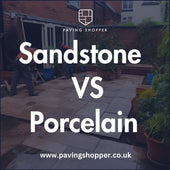
Sandstone V Porcelain Paving - (Style Comparison and Distinctions)
When choosing materials for your patio or driveway, two of the most popular options are sandstone paving slabs and p...
-

Understanding Gradients and Falls for Paving and Drainage (2024)
When it comes to paving and drainage projects, understanding the correct gradients and falls is essential for ensuri...
-
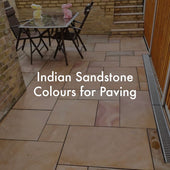
Indian Sandstone Paving Colours for A Patio - A Comprehensive Guide
Indian sandstone is one of the most popular paving materials, celebrated for its natural beauty and the variety of co...
-

Jointing and Pointing For Paving (Sand & Cement Mix)
Patio pointing is important for both looks and durability. It protects the layers under your paving, stops weeds, and...
-

How to Lay Paving on Sand and Cement: Expert Advice and Tips
Paving on Sand and Cement: A Comprehensive Guide When it comes to enhancing your outdoor space, paving is a popular ...
-

Pros and Cons of Sandstone Paving
Pros & Cons of Indian Sandstone Paving Indian sandstone paving is a natural and durable option that adds both bea...
-
Does Patio Paving Need Edging? A Comprehensive Guide
In this article, we'll explore the importance of patio edging, the different types of edging materials available, and...
-

Pet Friendly Paving - What is the best paving for a dog-friendly garden?
Creating a dog-friendly garden requires choosing the right paving materials to ensure your furry friends can enjoy t...
-

Patio Paving Laying Patterns Guide
Paving patterns can transform an ordinary outdoor space into a stunning and eye-catching area that complements your ...
-

Patio Kits vs Single Size Paving Slabs: Which To Choose?
When designing a patio or outdoor space, one crucial decision is whether to use a patio kit (also known as patio pack...
-

Are paving slabs suitable for driveways?
This is a question many homeowners ask when it comes to choosing the right type of driveway surface for their home. T...
-

How much paving do you need to cover your outdoor space?
Planning an outdoor paving project is exciting, but it’s crucial to accurately estimate the amount of paving needed b...
-

What is the Best Paving for Patios?
When it comes to choosing the best paving for patios, there are a variety of factors to consider, such as durability,...


















































